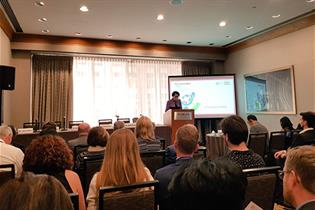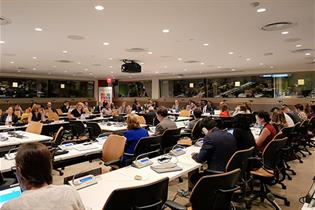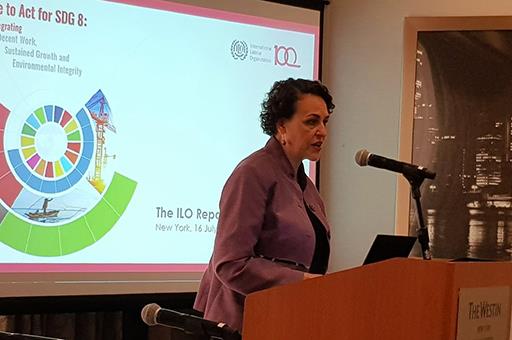High-level Political Forum on SDG in New York
Magdalena Valerio defends Government of Spain's commitment to sustainable economic growth and decent work at UN
News - 2019.7.17
While speaking to the United Nations Organisation (UN), the acting minister defended the importance of continued progress towards achieving Sustainable Development Goal 8 (SDG 8): full and productive employment and decent work for all.
At this High-level Forum, Magdalena Valerio underlined various elements of vital importance for Spain in its effort to achieve the 2030 Agenda: the local factor and the energy transition. She therefore defended local issues during the debate on the Sustainable Development Goals: "Local 2030: localising the SDG: The local dimensions of the SDG 8".
 Ministerio de Trabajo, Migraciones y Seguridad SocialIn her speech, the Minister for Work, Migration and Social Security explained that incorporation of the territorial dimension into the 2030 Agenda has been done "rigorously" in Spain. On the one hand, the "Spanish Urban Agenda" has been approved in order to promote and foster the urban economy, with specific actions tied to SDG 8. In this regard, initiatives have been promoted over the last 12 months to boost the Social Economy as a key way to give structure to regions and generate wealth and decent work at a local level.
Ministerio de Trabajo, Migraciones y Seguridad SocialIn her speech, the Minister for Work, Migration and Social Security explained that incorporation of the territorial dimension into the 2030 Agenda has been done "rigorously" in Spain. On the one hand, the "Spanish Urban Agenda" has been approved in order to promote and foster the urban economy, with specific actions tied to SDG 8. In this regard, initiatives have been promoted over the last 12 months to boost the Social Economy as a key way to give structure to regions and generate wealth and decent work at a local level.
Another cornerstone of the actions by the Government of Spain is related to creating decent work through green jobs. "We fully agree that the transition to a climate-neutral economy must be managed fairly and based on solidarity, combining energy and climate policies with growth and employment policies", said the Spanish minister, who recalled that Spain was particularly active, alongside the European Union, in the signing of the Paris Agreement on climate.
Magdalena Valerio said that, just like digitalisation and automation, the ecological and energy transition represents both a challenge and an opportunity for employment that requires a response.
In order to tackle the challenge of creating more jobs than can be lost to those transitions, she pointed to three necessary measures:
- Firstly, a commitment to active employment policies and especially training throughout people's working lives.
- Secondly, the implementation of social policies to help the most vulnerable people needing to readapt. "With that in mind, the Government of Spain is going to adopt a Fair Transition Strategy aimed at not leaving anyone behind, representing a clear example of localising SDG 8", she said.
- The third idea she expressed is that support from social stakeholders is essential for realising the transition to clean energy and climate neutrality. "Social dialogue will allow us to better define the necessary policies and know how effective they are", she concluded.
Level of progress on the SDG
 Ministerio de Trabajo, Migraciones y Seguridad SocialAlongside the Director-General of the International Labour Organisation (ILO), Guy Ryder, the acting minister also opened the seminar entitled "Accelerating progress under SDG 8 and promoting full employment and decent work for all", organised by the ILO.
Ministerio de Trabajo, Migraciones y Seguridad SocialAlongside the Director-General of the International Labour Organisation (ILO), Guy Ryder, the acting minister also opened the seminar entitled "Accelerating progress under SDG 8 and promoting full employment and decent work for all", organised by the ILO.
This High-level Forum was used to debate and analyse the level of progress made by the various countries on SDG 8 based on the results report drawn up by the ILO. In her speech, Magdalena Valerio acknowledged the great work being done by the ILO to achieve social justice and universal peace through the fundamental rights enshrined in the pillars of decent work. She also highlighted the Government of Spain's commitment to the Sustainable Development Goals and the 2030 Agenda.
 Ministerio de Trabajo, Migraciones y Seguridad SocialThe Spanish Minister for Work, Migration and Social Security explained in her speech that Spain has "fully" assumed SDG 8 and underlined the progress by Spain's Action Plan to Implement the 2030 Agenda during its first year. She particularly highlighted the progress made on objective 8 (full employment and decent work), a goal on which "substantial" progress is being made in the EU as a whole when compared with the 17 SDG as a whole, according to a report published by EUROSTAT in June this year.
Ministerio de Trabajo, Migraciones y Seguridad SocialThe Spanish Minister for Work, Migration and Social Security explained in her speech that Spain has "fully" assumed SDG 8 and underlined the progress by Spain's Action Plan to Implement the 2030 Agenda during its first year. She particularly highlighted the progress made on objective 8 (full employment and decent work), a goal on which "substantial" progress is being made in the EU as a whole when compared with the 17 SDG as a whole, according to a report published by EUROSTAT in June this year.
"This positive trend has been significantly strengthened in Spain over the course of last year", said Magdalena Valerio. The minister stressed that Spain has developed "highly significant" actions to boost that upward trend tied to the SDG, paying special attention to young people and the long-term unemployed.
"Our government is convinced that there cannot be economic growth if it is not sustainable, if it is not based on social justice. And that's why we believe that we cannot create any jobs besides quality jobs or, in terms used by the 2030 Agenda, decent work", said Magdalena Valerio.
Among the measures implemented by Spain, she highlighted the Master Plan for a Decent Job, which has allowed employment quality to be improved for more than 220,000 people, the 22% increase in the Inter-professional Minimum Wage in the last year and the pension re-assessment. Measures have also been adopted to strengthen gender equality at work and to foster joint responsibility between men and women for looking after their children, such as increasing paternity leave to the same level as maternity leave and increased wage transparency at companies.
The minister particularly mentioned young people. Magdalena Valerio underlined the 11-point decrease in youth unemployment since the worst moment of the economic crisis. "But we cannot rest o our laurels because unemployment and precariousness still affect many - too many - of our young people", she said.
In this regard, she mentioned the approval of an Action Plan on Youth Employment for the next three years, which includes 50 measures focused on active and personalised guidance, the promotion of professional and dual training, a strong investment in digital skills and key competencies, and support for entrepreneurship. All this is accompanied by hard work on the ILO Global Initiative on Decent Jobs for Youth, as an instrument that has allowed efforts to be combined in order to improve the situation of young people internationally.
Magdalena Valerio also mentioned a series of actions carried out by the Government of Spain that impact on at least 6 targets for SDG 8: improved protection for self-employed workers; support and encouragement for the Social Economy; strengthened Social Dialogue as a core aspect in the design of social policies; and support for the most disadvantaged groups in terms of employment, such as the long-term unemployed, persons with disabilities and older workers. "All the actions taken have helped to further develop social cohesion in our country, another source of motivation to maintain our efforts in this direction", said Magdalena Valerio.
 Ministerio de Trabajo, Migraciones y Seguridad SocialThe acting minister expressed moderate satisfaction with the trends shown by the indicators, although she insisted that she is not complacent because "we are fully aware of the long path we have still to travel". On the one hand, Spain is creating jobs at a rate of about 3% and "we have just beaten our old record number of National Insurance contributors". However, "the persistently high rates of unemployment and situations of inequality, the situation being experienced by the most disadvantaged groups and the precariousness of certain types of work force us to remain unsatisfied and keep working", she said.
Ministerio de Trabajo, Migraciones y Seguridad SocialThe acting minister expressed moderate satisfaction with the trends shown by the indicators, although she insisted that she is not complacent because "we are fully aware of the long path we have still to travel". On the one hand, Spain is creating jobs at a rate of about 3% and "we have just beaten our old record number of National Insurance contributors". However, "the persistently high rates of unemployment and situations of inequality, the situation being experienced by the most disadvantaged groups and the precariousness of certain types of work force us to remain unsatisfied and keep working", she said.
Before her speech at the ILO Forum, Magdalena Valerio took the opportunity provided by her visit to New York to hold a bilateral meeting with the President of the United Nations General Assembly, María Fernanda Espinosa, who congratulated Spain on the progress made in the last year on the recovery of spaces for women and fighting for real equality, as well as its commitment to the 2030 Agenda SDG.
Non official translation





